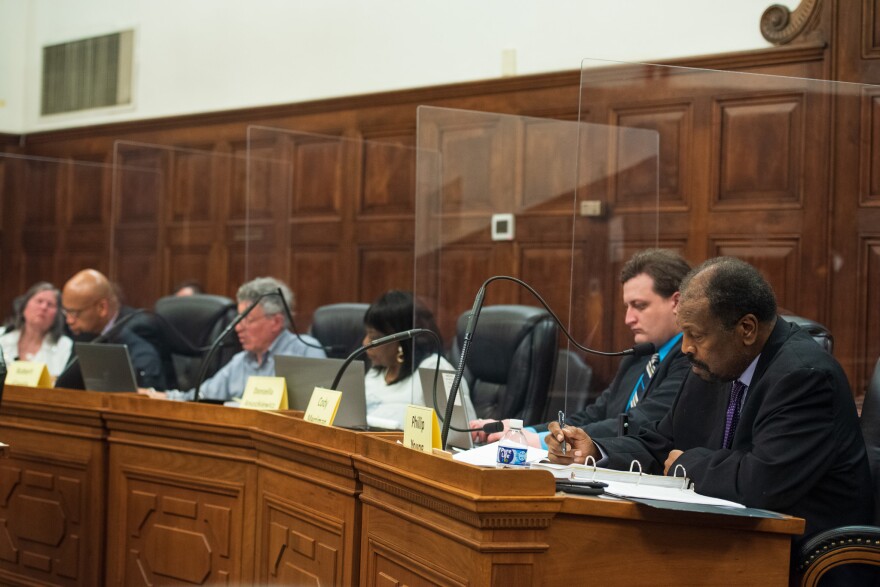Akron’s new Citizens' Police Oversight Board had a rocky start, through no fault of its members. City council failed to approve the board members by the February deadline prescribed by the city’s charter, and the board was not fully seated until a month later on March 30.
Two months later, the nine-member board now meets every week and has made some progress in figuring out its internal logistics.
They’ve also heard numerous concerns from the public – either during the meeting’s public comment periods, or through private conversations – about the Akron Police Department.
“We’ve heard from countless citizens - their fears of police retaliation, complaints, targeted disappearances and so on,” board member Brandyn Costa said while speaking to citizens at a recent protest. “These citizens are exhausted of their concerns being swept under the rug, so I’m here to say that we’re hearing you.”
Costa and several other members of the review board attended the march, which was held to protest a grand jury’s decision not to indict the Akron police officers who fatally shot Jayland Walker, a 25-year-old Black man, last year.
Walker’s death sparked calls for police reform, and citizens collected signatures on Issue 10, a charter amendment to create an oversight board, on the November ballot. Voters overwhelmingly approved Issue 10.
The full Citizens' Police Oversight Board meets every Wednesday evening and breaks into subcommittees throughout the week.
Board hears a range of concerns from police auditor
Each Wednesday, Akron’s police auditor Phil Young, whom the board oversees, gives members an update about citizen complaints he’s looking into.
Young has brought forth numerous concerns about barriers he experiences while investigating complaints. One of his top concerns is that he is not able to go through body camera footage in a timely manner, in part because Akron officers currently do not have to wear their nametags.
“It’s impossible for me because I don’t know who the officers are, because it’s not on the video anymore,” Young said in the most recent board meeting on May 24, 2023. “So, if I see something, I have to call over and say, ‘hey, pull this video, who is that officer.’”
Akron Police Chief Stephen Mylett has allowed officers to remove their nametags, citing safety concerns and threats made against the department.
Lt. Michael Miller, public information officer for the Akron Police Department, told Ideastream Public Media he disagrees with Young's comments. There are numerous ways to identify an officer aside from their nametag, such as their car or badge number, he said.
The body camera footage itself also contains information that could help identify the officer, Miller added.
“Essentially, it’s equivalent to a digital footprint,” he said. “Each one of those are assigned to a specific officer … when [the camera is] on, when it’s off, when the officer logs in and when he logs off.”
Young acknowledged that these are alternative options, but looking for them takes extra time, especially when there are multiple videos to review, he said.
For example, Young received 19 different bodycam videos for a recent complaint. Each are an hour long, he said.
“It’s not bad when you’ve got three or four officers, but when you’ve got 19 people and you’re trying to figure out who they are, [it is,]” he said.
Young also said he is only permitted to view body camera footage for 30 days before it expires.
Ideastream Public Media has asked for the reasoning behind that policy but has not yet received a response from the police department.
Board chair Kemp Boyd asked Young to provide documentation of the complaints he’s received, and other members asked him to write out his top concerns.
The additional data will help them work toward solutions, Boyd said.
“What you’re laying out, man, is alarming and concerning, and so there’s a responsibility that we all carry now,” Boyd said. “Now we know the information, and so now there’s an obligation to do something based on what we know.”
Subcommittees are hiring staff and writing the rules
In April, the board created four subcommittees: governance, budget and finance, human resources and community engagement.
The governance committee is tasked with writing the body’s rules and procedures. Currently, members are figuring out the extent of the board’s authoritative powers as outlined in the charter, including the power to subpoena and conduct investigations.
At its next meeting Wednesday evening, the full board will go into executive session with the city’s law department. They are hoping to gain insight from city lawyers about the board’s subpoena power, investigative authority, and potential conflicts with the police union’s collective bargaining agreement, said Bob Gippin, chair of the governance committee.
After that, they may seek an opinion from an independent legal expert, Gippin added.
The governance committee is meeting next at 5:30 p.m. Tuesday at the North Hill Branch of the Akron-Summit County Public Library.
Meanwhile, the human resources subcommittee is in the process of conducting interviews to hire an administrative assistant who would work under the police auditor. This committee is meeting at 6 p.m. Tuesday.
Members of the community engagement committee meet on Wednesdays. They are attending community events and planning a meet-and-greet to officially introduce the board to citizens at the end of July.
The budget subcommittee is figuring out its financial policies, such as keeping track of the board members’ hours and approving expenditures. This committee is meeting at 5 p.m. Tuesday at the North Hill Branch of the Akron-Summit County Public Library.








